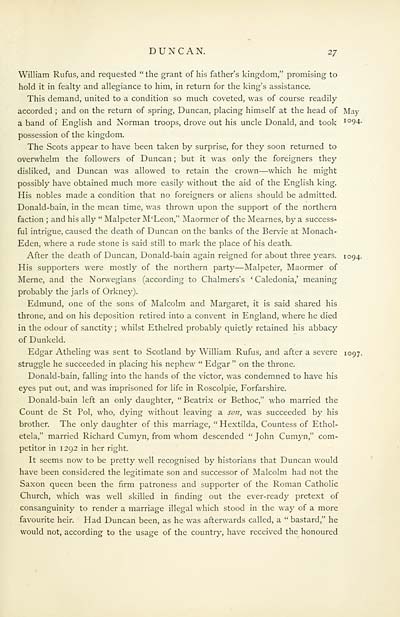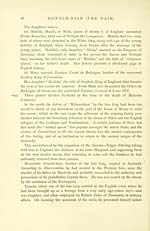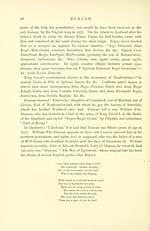Family records of the Bruces and the Cumyns
(39) Page 27
Download files
Complete book:
Individual page:
Thumbnail gallery: Grid view | List view

DUNCAN. 27
William Rufus, and requested " the grant of his father's kingdom," promising to
hold it in fealty and allegiance to him, in return for the king's assistance.
This demand, united to a condition so much coveted, was of course readily
accorded ; and on the return of spring, Duncan, placing himself at the head of May
a band of English and Norman troops, drove out his uncle Donald, and took I0 94-
possession of the kingdom.
The Scots appear to have been taken by surprise, for they soon returned to
overwhelm the followers of Duncan ; but it was only the foreigners they
disliked, and Duncan was allowed to retain the crown — which he might
possibly have obtained much more easily without the aid of the English king.
His nobles made a condition that no foreigners or aliens should be admitted.
Donald-bain, in the mean time, was thrown upon the support of the northern
faction ; and his ally " Malpeter M'Leon," Maormer of the Mearnes, by a success-
ful intrigue, caused the death of Duncan on the banks of the Bervie at Monach-
Eden, where a rude stone is said still to mark the place of his death.
After the death of Duncan, Donald-bain again reigned for about three years. 1094.
His supporters were mostly of the northern party — Malpeter, Maormer of
Merne, and the Norwegians (according to Chalmers's ' Caledonia,' meaning
probably the jarls of Orkney).
Edmund, one of the sons of Malcolm and Margaret, it is said shared his
throne, and on his deposition retired into a convent in England, where he died
in the odour of sanctity ; whilst Ethelred probably quietly retained his abbacy
of Dunkeld.
Edgar Atheling was sent to Scotland by William Rufus, and after a severe 1097.
struggle he succeeded in placing his nephew " Edgar " on the throne.
Donald-bain, falling into the hands of the victor, was condemned to have his
eyes put out, and was imprisoned for life in Roscolpie, Forfarshire.
Donald-bain left an only daughter, "Beatrix or Bethoc," who married the
Count de St Pol, who, dying without leaving a son, was succeeded by his
brother. The only daughter of this marriage, " Hextilda, Countess of Ethol-
etela," married Richard Cumyn, from whom descended " John Cumyn," com-
petitor in 1 292 in her right.
It seems now to be pretty well recognised by historians that Duncan would
have been considered the legitimate son and successor of Malcolm had not the
Saxon queen been the firm patroness and supporter of the Roman Catholic
Church, which was well skilled in finding out the ever-ready pretext of
consanguinity to render a marriage illegal which stood in the way of a more
favourite heir. Had Duncan been, as he was afterwards called, a " bastard," he
would not, according to the usage of the country, have received the honoured
William Rufus, and requested " the grant of his father's kingdom," promising to
hold it in fealty and allegiance to him, in return for the king's assistance.
This demand, united to a condition so much coveted, was of course readily
accorded ; and on the return of spring, Duncan, placing himself at the head of May
a band of English and Norman troops, drove out his uncle Donald, and took I0 94-
possession of the kingdom.
The Scots appear to have been taken by surprise, for they soon returned to
overwhelm the followers of Duncan ; but it was only the foreigners they
disliked, and Duncan was allowed to retain the crown — which he might
possibly have obtained much more easily without the aid of the English king.
His nobles made a condition that no foreigners or aliens should be admitted.
Donald-bain, in the mean time, was thrown upon the support of the northern
faction ; and his ally " Malpeter M'Leon," Maormer of the Mearnes, by a success-
ful intrigue, caused the death of Duncan on the banks of the Bervie at Monach-
Eden, where a rude stone is said still to mark the place of his death.
After the death of Duncan, Donald-bain again reigned for about three years. 1094.
His supporters were mostly of the northern party — Malpeter, Maormer of
Merne, and the Norwegians (according to Chalmers's ' Caledonia,' meaning
probably the jarls of Orkney).
Edmund, one of the sons of Malcolm and Margaret, it is said shared his
throne, and on his deposition retired into a convent in England, where he died
in the odour of sanctity ; whilst Ethelred probably quietly retained his abbacy
of Dunkeld.
Edgar Atheling was sent to Scotland by William Rufus, and after a severe 1097.
struggle he succeeded in placing his nephew " Edgar " on the throne.
Donald-bain, falling into the hands of the victor, was condemned to have his
eyes put out, and was imprisoned for life in Roscolpie, Forfarshire.
Donald-bain left an only daughter, "Beatrix or Bethoc," who married the
Count de St Pol, who, dying without leaving a son, was succeeded by his
brother. The only daughter of this marriage, " Hextilda, Countess of Ethol-
etela," married Richard Cumyn, from whom descended " John Cumyn," com-
petitor in 1 292 in her right.
It seems now to be pretty well recognised by historians that Duncan would
have been considered the legitimate son and successor of Malcolm had not the
Saxon queen been the firm patroness and supporter of the Roman Catholic
Church, which was well skilled in finding out the ever-ready pretext of
consanguinity to render a marriage illegal which stood in the way of a more
favourite heir. Had Duncan been, as he was afterwards called, a " bastard," he
would not, according to the usage of the country, have received the honoured
Set display mode to:
![]() Universal Viewer |
Universal Viewer | ![]() Mirador |
Large image | Transcription
Mirador |
Large image | Transcription
Images and transcriptions on this page, including medium image downloads, may be used under the Creative Commons Attribution 4.0 International Licence unless otherwise stated. ![]()
| Histories of Scottish families > Family records of the Bruces and the Cumyns > (39) Page 27 |
|---|
| Permanent URL | https://digital.nls.uk/95071454 |
|---|
| Description | A selection of almost 400 printed items relating to the history of Scottish families, mostly dating from the 19th and early 20th centuries. Includes memoirs, genealogies and clan histories, with a few produced by emigrant families. The earliest family history goes back to AD 916. |
|---|

